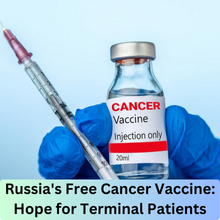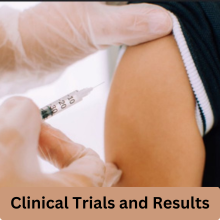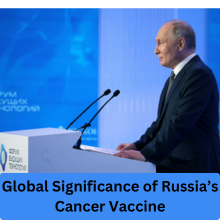
In an unprecedented move, Russia has developed an mRNA vaccine for cancer, which it promises to distribute for free to terminally ill patients. This groundbreaking announcement has captured global attention, especially among cancer patients, healthcare professionals, and researchers. For the first time, a major country is offering cancer treatment at no cost, with the goal of providing hope to those in the most dire of circumstances. But what exactly is this new vaccine, and how could it change the course of cancer treatment forever?
What Is the New Cancer Vaccine?
Russia’s newly developed cancer vaccine uses mRNA (messenger RNA) technology, a type of treatment previously employed in COVID-19 vaccines. The vaccine was developed in collaboration with several top Russian research centers and is expected to be ready for public use by early 2025. In simple terms, an mRNA vaccine works by instructing our cells to produce a protein that mimics a part of the cancer-causing agent. This protein triggers an immune response, helping the body recognize and fight cancer cells.
While the vaccine is still in the pre-clinical trial phase, early results are promising. According to Alexander Gintsburg, Director of the Gamaleya National Research Center for Epidemiology and Microbiology, the vaccine has shown potential in suppressing tumor growth and preventing metastasis, a major concern in cancer treatment. This breakthrough could revolutionize how we approach cancer treatment and potentially save millions of lives.
What Makes mRNA Vaccines Different from Traditional Ones?
Traditional vaccines usually introduce weakened or inactivated viruses, or their proteins, to stimulate an immune response. However, mRNA vaccines take a different approach. Instead of introducing the actual virus or a part of it, they provide the body with instructions on how to make a protein that mirrors the virus or cancer cells. This allows the immune system to recognize and fight off the disease more effectively.
The significant advantage of mRNA technology lies in its speed and adaptability. Unlike traditional vaccines, which can take years to develop, mRNA vaccines can be designed in a matter of weeks, as seen with the COVID-19 vaccines. This same flexibility could give researchers the ability to develop personalized cancer vaccines tailored to individual patients’ needs.
The Role of Russia’s Radiology Medical Research Center
The Radiology Medical Research Center, a division of Russia’s Ministry of Health, has played a critical role in the development of this vaccine. Under the leadership of Andrey Kaprin, the center has become a leading force in cancer research. Kaprin’s vision and leadership have been key in pushing forward innovative cancer treatments, including this mRNA vaccine.
The research center’s collaboration with other Russian institutions, including the Gamaleya National Research Center, has been essential in developing a vaccine that could one day be available to cancer patients worldwide. This marks a major milestone for both Russian healthcare and global cancer research.
Clinical Trials and Results
The pre-clinical trials for the cancer vaccine have shown promising results. Tumor suppression and the prevention of metastasis are two of the primary benefits observed in these early studies. These findings are incredibly exciting because they suggest the vaccine could do more than just prevent cancer—it could stop its spread.
Of course, more rigorous clinical trials are needed to ensure the vaccine’s safety and efficacy in humans. But the initial results provide a glimpse of the potential this vaccine holds, not only in Russia but for cancer treatment worldwide. With a projected release in 2025, it’s clear that researchers are working diligently to bring this treatment to the public as soon as possible.
Also read: YouTube TV Hikes Prices by 14%: What You Need to Know
The Potential Impact on Cancer Treatment
Cancer continues to be one of the leading causes of death globally, and the economic and emotional toll it takes on patients and their families is immense. In 2020, there were an estimated 19.3 million new cancer cases worldwide, and this number is only expected to rise. While conventional cancer treatments like chemotherapy, radiation, and surgery have been effective for many patients, they are often not enough, especially for those with terminal or metastatic cancer.
A free vaccine could change the game entirely. For terminally ill patients who have exhausted other treatment options, a vaccine that halts cancer growth could offer a chance at life. Moreover, providing the vaccine free of charge would make it accessible to millions of people who might otherwise be unable to afford such a revolutionary treatment.
Can Artificial Intelligence Play a Role?
One of the most fascinating aspects of Russia’s cancer vaccine initiative is its potential to incorporate artificial intelligence (AI) into the development process. According to Alexander Gintsburg, AI could play a key role in creating personalized cancer vaccines. With the help of artificial neural networks, researchers could significantly shorten the time required to create a tailored vaccine. What currently takes months could potentially be reduced to under an hour with the help of AI.
This innovation could make personalized cancer treatment much more accessible, allowing doctors to create vaccines that are specifically designed for an individual’s cancer cells. The integration of AI into the vaccine development process is a game-changer, potentially allowing for faster, more effective treatments for cancer patients.
Global Significance of Russia’s Cancer Vaccine
While Russia is the first country to announce the development of a free cancer vaccine, the global significance of this breakthrough cannot be overstated. If the vaccine proves to be as effective as early trials suggest, it could become a model for other countries to follow. In addition to providing hope for cancer patients, it could spur international collaboration in cancer research, with nations pooling resources and knowledge to accelerate the development of new treatments.
For countries with limited access to expensive cancer treatments, a free vaccine could be a lifeline, providing much-needed support for their healthcare systems. This is not just a victory for Russia; it could be a victory for cancer patients everywhere.
What Does This Mean for Terminal Cancer Patients?
For terminally ill patients, the development of this vaccine is a beacon of hope. Many terminal cancer patients have few options left, and the possibility of a vaccine that can prevent cancer growth or metastasis is nothing short of revolutionary. Being able to access such a vaccine for free is especially significant, as cancer treatment can be prohibitively expensive.
In addition to the physical benefits, the psychological and emotional relief that this vaccine could provide to patients and their families is profound. The hope of having a new tool in the fight against cancer can lift spirits, offering not just a chance at survival, but also a renewed sense of hope.
When Will the Vaccine Be Available?
The vaccine is expected to be ready for public use by early 2025. While that timeline may seem far off, researchers are working hard to ensure that the vaccine is safe and effective. Clinical trials, both in Russia and potentially in other countries, will be crucial in proving the vaccine’s viability.
How Russia’s Free Cancer Vaccine Could Shape the Future
Russia’s initiative to provide cancer vaccines free of charge could set a precedent for other nations. If successful, this model of providing life-saving treatment at no cost could change the way we approach healthcare worldwide. It could lead to greater equity in cancer care, ensuring that everyone, regardless of their economic situation, has access to cutting-edge treatments.
Challenges in Implementing the Vaccine Program
Despite the promise of this vaccine, there are several challenges that need to be addressed. One of the biggest hurdles is the logistical challenge of distributing the vaccine to every cancer patient who needs it. This includes ensuring there is enough vaccine production to meet demand and that healthcare systems are prepared to administer it.
Additionally, the funding required to provide the vaccine for free could be a barrier. While Russia’s government has committed to covering the costs, other countries may need to explore alternative funding models to make a similar program feasible.
Also read: Get Up to $1,500 Fast: Jackson Hewitt Holiday Loan Explained
Conclusion
Russia’s announcement of a free cancer vaccine represents a major breakthrough in the fight against cancer. This vaccine has the potential to change the landscape of cancer treatment, providing new hope for patients who may have otherwise had no options. With the involvement of AI in personalized cancer vaccine development and the commitment to making the vaccine accessible to all, this could be the start of a new era in cancer care.
FAQs
Can this vaccine cure all types of cancer?
While the vaccine has shown promise in early trials, more research is needed to determine its effectiveness against different types of cancer.
How will Russia distribute the vaccine to patients?
The vaccine will be distributed through Russia’s healthcare system, with a focus on terminally ill patients.
Can AI really help develop personalized cancer vaccines in less than an hour?
According to experts, AI could speed up the process significantly, making personalized vaccines a reality much sooner.
Will the vaccine be available to patients outside of Russia?
While the initial rollout will focus on Russia, there is potential for international collaboration and distribution in the future.
How will this vaccine change the future of cancer treatment?
The free vaccine could make cutting-edge cancer treatment accessible to millions, offering a new tool in the fight against cancer and changing the way we think about cancer care.

